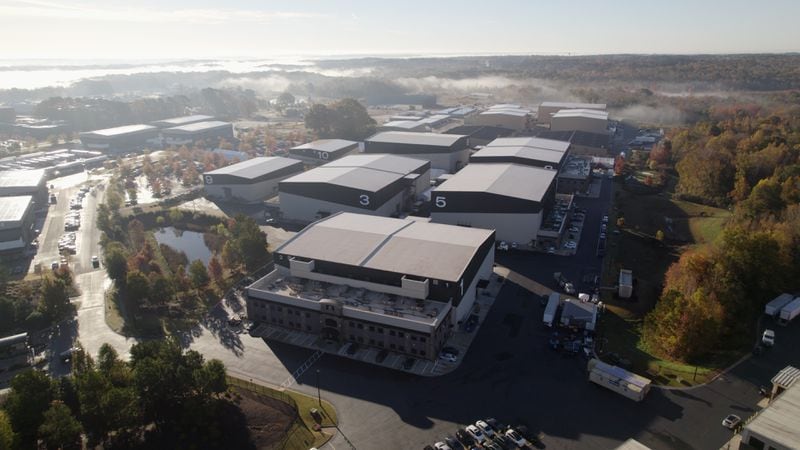It’s not a problem confined to Georgia. Globally, production is down by 7% year-over-year, with feature films seeing the most dramatic decrease at 24%.
The slow return to work is challenging both actors and crew in the state, who spent the latter half of last year unable to work because of the back-to-back writers and actors strikes. The downturn is also leaving some soundstages empty. Georgia doubled its available soundstage space over the last five years amid a pandemic-era boom in filming.
“We’re in the middle of an evolution,” said Crag Miller, an Atlanta film producer who helps production companies find crew members and locations for movies and TV shows. “But we’re seeing a major turn in entertainment. Note the moment, because whatever happens next, it will lead us to what the future holds.”
There are a few reasons why production hasn’t resumed with great fervor.

Credit: TRILITH STUDIOS
Credit: TRILITH STUDIOS
For one, some studios are fearful of production stoppages from another strike. Both the International Alliance of Theatrical Stage Employees (IATSE), which is the union representing behind-the-scenes crew members like camera operators and costume designers, and the Hollywood Basic Crafts union, a Teamsters affiliate which covers drivers, caterers, animal trainers, plumbers and other off-camera crew, must negotiate new contracts with the Alliance of Motion Picture and Television Producers by July 31. The two sides — the producers and the unions — have yet to reach an agreement.
“Big productions are leery of jumping onto a big studio rental and beginning lots of construction without knowing whether a potential strike might shut them down,” Miller said.
Plus, the industry is shrinking as major studios and streamers consolidate and prioritize driving profit.
There isn’t as much money out there for new scripted content. In the 2010s, the industry went down a dangerous financial path of trying to invest in every type of content in every genre to try to appeal to every consumer, said JB Perrette, the CEO and President of Warner Bros. Discovery’s global streaming and games division, during an earnings call last month. Now, after several years of spending like there’s no tomorrow, observers say major studios and streamers are looking for ways to cut costs.
Disney is reducing its Marvel Studios output — superhero-based projects that are often filmed in Georgia — to two-to-three films and two series per year. For its Pixar animated division, it is shifting its strategy to making movies with clear mass appeal, such as sequels and spinoffs to familiar franchises.
Paramount, an acquisition target, could merge with rival Skydance Media. As Skydance and other potential suitors are circling, Paramount is prioritizing lower-cost content. This includes unscripted shows, and leaning into offshore production. And every entertainment giant, it seems, is looking at live sports programming as the road to recovery and growth, from Amazon to Netflix.
A number of reality and docuseries projects are filming in Atlanta, which are cheaper to produce and require fewer crew members than feature films or scripted TV. Out of the 39 projects now filming in the state, 16 are reality, according to the updated list from the Georgia Film Office.
Eric Anthony Leong, a Lilburn prop fabricator, has been able to find small jobs on Georgia productions since the end of the strikes. But recently, he had to find work in Boston because there wasn’t enough going on here.

Credit: RODNEY HO/r
Credit: RODNEY HO/r
“It’s slow. Lots of people are still out of work. Some vendors like RJR Props are picking up but it’s not like it used to be,” Leong said, referring to the huge producer of props in Fulton County.
But part of Georgia’s production decline — and the global slowdown at large — is normalization, said Scott Geyman, ProdPro’s director of product and operations.
In 2021 and 2022, production surged as streamers competed for market share and tried to drive their subscriber growth through original programming. And Georgia met the demand. Since 2020, developers have doubled the amount of soundstage space in Georgia. Five new studios opened in Georgia over the past year-and-a-half, and several others have added soundstages.
The state now has nearly 4.4 million square feet of available space, which is the most out of any single state except California. Much of this space sat empty during last year’s strikes.
“A lot of the studios have kind of reached that saturation point,” Geyman said. “Now, it’s like: ‘What is that level of normal?’”
Miller predicts that production will rebound later this year, if an IATSE-Teamsters strike is avoided.
“They’re all waiting to see what’s going to happen,” Miller said.
– Staff writer Rodney Ho contributed to this report.
if (!window.fbq) {
!function(f,b,e,v,n,t,s){
if(f.fbq)return;n=f.fbq=function(){n.callMethod?
n.callMethod.apply(n,arguments):n.queue.push(arguments)};
if(!f._fbq)f._fbq=n;n.push=n;n.loaded=!0;n.version=’2.0′;
n.queue=[];t=b.createElement(e);t.async=!0;
t.src=v;s=b.getElementsByTagName(e)[0];
s.parentNode.insertBefore(t,s)}(window, document,’script’,
‘https://connect.facebook.net/en_US/fbevents.js’);
fbq(‘init’, 812212812506283);
}



